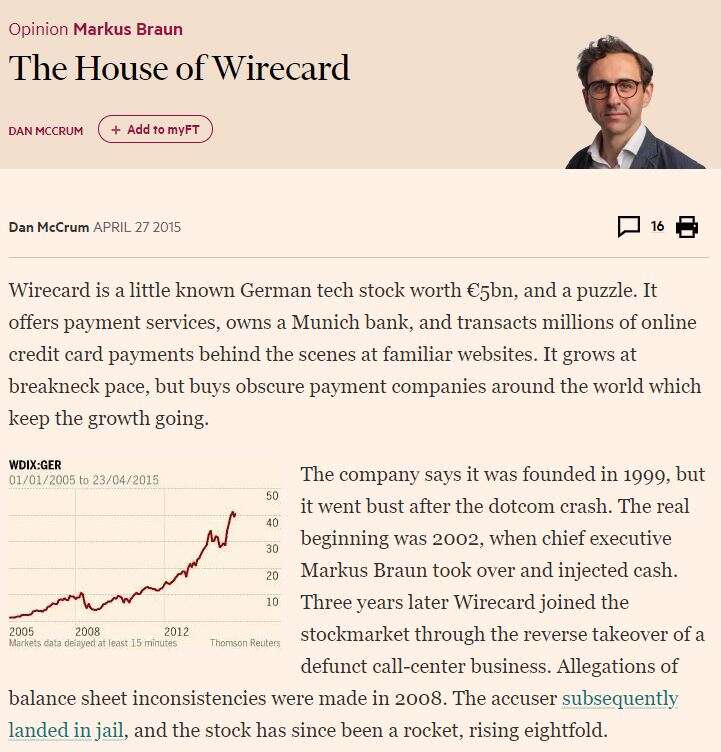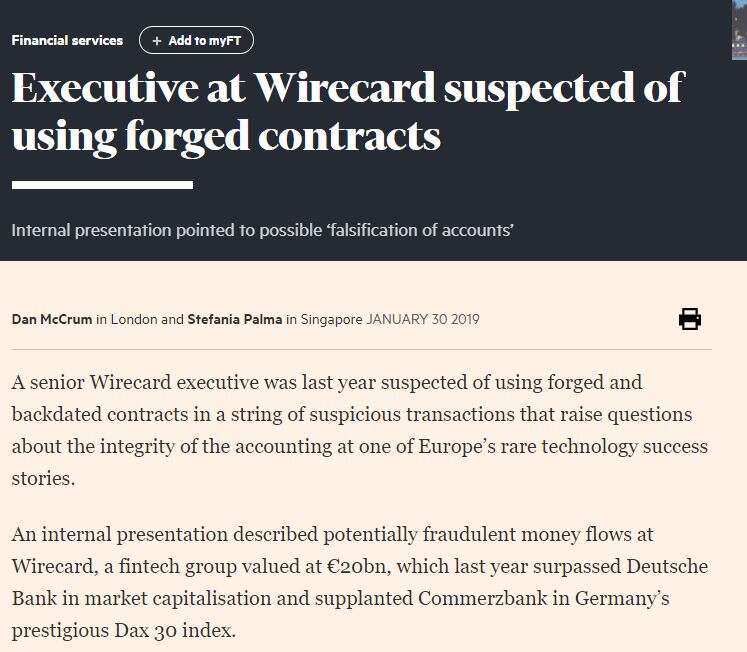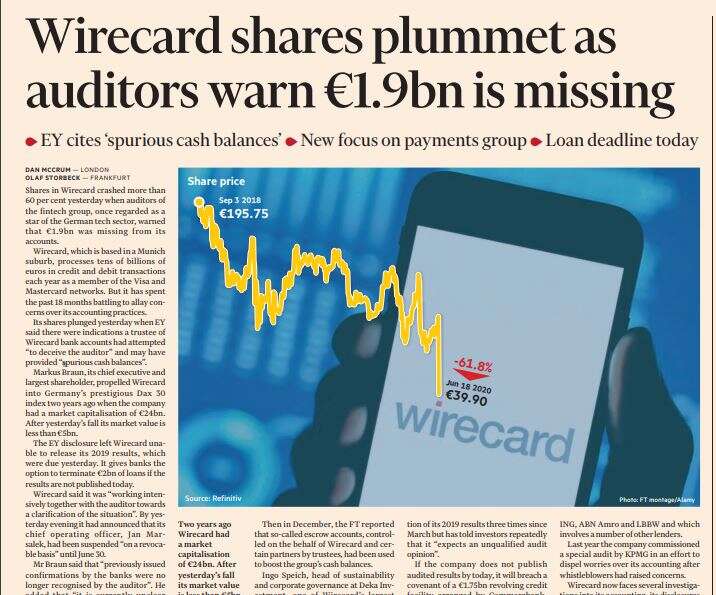
The FT Wirecard investigation began with a tip from a hedge fund manager to Dan McCrum, a reporter on the title’s Alphaville markets blog.
“Would you be interested in some German gangsters?”
This lead prompted a six-year investigation that culminated in the exposure of the world’s biggest financial fraud since Enron, the collapse of Germany’s €24bn fintech powerhouse Wirecard, the arrest of its chief executive, and the flight of COO Jan Marsalek (who remains at large).
Along the way McCrum was threatened with jail by the German state, subject to hacking and physical surveillance (along with FT colleagues) and smeared as a crooked journalist.
All in all, Wirecard has been a hell of a story and one that is soon to be retold in a documentary film and McCrum-authored book.
The story was named investigation of the year at last year’s British Journalism Awards and led to McCrum being named journalist of the year and the FT picking up news provider of the year for a record third consecutive time.
[Entries for the 2021 British Journalism Awards are open now and close on 30 September]Rolling the clock back to that first Wirecard tip in 2014, McCrum says: “Back then it was this little-known German company worth four or five billion euros who pretty much no one had heard of. The first question was what is Wirecard? And its numbers didn’t add up.”
Based in a Munich suburb, Wirecard processed tens of billions of euros in credit and debit transactions each year as a member of the Visa and Mastercard networks.
McCrum’s first Alphaville post, in April 2015, headlined The House of Wirecard – ran a slide rule over the numbers and questioned its sky-high valuation.

For financial reporter McCrum and his colleagues, reporting on Wirecard was unlike any other story they had covered. At worst, business reporters can expect to deal with prickly PRs or threatening lawyers, but taking on Wirecard was akin to going to war with a criminal gang.
He says: “One of the amazing things about reporting on Wirecard was it never acted like a normal company. We kept learning things about Wirecard and its friends that we couldn’t print.
“There were hackers involved, there was surveillance and private detectives, there was blatant market manipulation, and at one point my boss, Paul Murphy, was even offered a $10m bribe to make all the stories go away. It was amazing.
“We were baffled as to why you would even pay $10m to make all the stories go away. It was so far outside our experience. It constantly gave us the impetus to keep going.”
McCrum is keen to emphasise that the Wirecard investigation was very much a team effort. He cites FT editors Lionel Barber and Roula Khalaf “for backing an aggressive investigations team and signing off on all the legal bills that allowed us to do this and sticking through some pretty intense pushback from the company and at times large parts of the German corporate establishment”.
He also pays tribute to Nigel Hanson, the FT’s “badass lawyer”; Stephania Palmer, “who pounded the streets of Singapore and the Philippines”; “Sam Jones for exposing how an executive of an asset finance institution was trying to construct some sort of Libyan militia force”; “Helen Warrell for exposing the army of private detectives who were spying on us and our sources”; and “Olaf Storbeck for his tremendous work on the German side of things”.
And he thanks his wife who, like him, suffered hacking attempts and smears.
Paul Murphy oversaw the Wirecard investigation first as Alphaville and then investigations editor.
“Every time we hit a roadblock Paul would take a step back and say hang on a second, we know we are dealing with a criminal enterprise here,” McCrum says. “But for a long time there was none of that we could actually write because libel laws being what they are it is incredibly hard to use the word ‘fraud’ in an article about a very well-resourced financial institution.”
 Promoted white paper: How newsrooms can leverage automation
Promoted white paper: How newsrooms can leverage automation
Read United Robots’ 12-page report on newsroom automation: What it is and how it can make journalism better.
The whistleblowers and Project Ahab
As is often the case with investigations, the key revelations were made possible by anonymous insiders coming forward at some personal risk.
“The key turning point was when the whistleblowers arrived – without the whistleblowers it would not have been possible for any of this to happen,” McCrum says. “I remain eternally grateful to the whistleblowers who took the risk to first reach out and tell us what they had seen inside Wirecard. That was the lead we needed.
“Wirecard’s response to that and some of the outrageous tactics we experienced in pursuing it finally led us to where we got to. The truth came out and it was a giant fraud.”
These sources led to a trove of documents exposing Wirecard’s efforts to falsify transactions and thus increase its revenue. McCrum spent three months analysing them in a windowless office using an offline “air-gapped” computer. For extra security protection, FT insiders avoided referring to Wirecard by name, instead calling the investigation Project Ahab (an inside joke about the German financial giant being McCrum’s white whale).
The FT went public with its findings in January 2019, revealing how the company had used “forged and backdated contracts in a string of suspicious transactions”.

After an initial dive in the company’s share price, it began to climb again. And Wirecard succeeded in largely shrugging off the revelations, alleging that they were minor irregularities and that the FT was involved in insider trading by leaking information ahead of publication.
After battling lawyers, and completing its own internal investigation into the insider trading claims, in October 2019 the FT staked its reputation on publishing documents that Wirecard said were faked but which showed that half of its claimed business did not exist.

It would take a further eight months for German regulators to catch up, but in June 2020 Wirecard admitted that €1.9bn was missing from its balance sheet and the company imploded.

The potential costs of getting this story wrong were colossal. Under UK libel law companies can claim special damages if they can prove a defamatory story caused them actual harm.
McCrum: ‘You feel like you are going to throw up’
So there were some tense meetings before the FT’s big reveal.
McCrum says: “We had one meeting when we thought we were going to go and then a QC got on the line and told us actually we are not going to go at all. We had to take a step back and rethink. It always came down to Lionel Barber’s decision and there would be that moment where he said: ‘That’s it, print it.’
“Those are moments where you feel like you are going to throw up because you’ve checked every single thing you can but this is a step into the unknown. What are they going to come back with? That moment is pretty intense.
“With each story, in some respects we were peeling an onion. Every time we published it did feel like this huge step into the unknown. What have we missed, what are they going to hit us with next?
“Litigation was a big threat and there was a moment when this felt like this was the reputation of the Financial Times. Wirecard turned this into a battle between the FT and itself.
“One of them had to be wrong and for a long time it looked like it was the FT… Wirecard had the backing of the world’s largest technology investor, Softbank.”
At one point McCrum himself was facing the prospect of jail in Germany.
“Wirecard’s response to our stories was to say they were completely untrue. One of the executives there, Jan Marsalek, seems to have been key in trying to frame me and my colleague Stephania Palmer for market manipulation. There was a criminal investigation in Germany into the idea that we had leaked the story beforehand and it was all just an attempt to manipulate the Wirecard share price.
“There was a point where we were having discussions about could I go to Germany and if I went there could I get arrested? Seeing the inside of a German prison cell, even just to get briefly arrested, was a definite possibility at one point.”
Wirecard threw everything it had at trying to stop the FT’s journalism short of actual physical intimidation – including hiring the services of London’s leading law and PR firms to run interference.
McCrum also ran up against shady former special forces and intelligence operatives: “There were extremely sophisticated black ops to discredit us, to spy on our sources, to concoct evidence that we were leaking stories in advance. It was unlike anything any of us had experienced before.
“I was subjected to a persistent online hacking campaign for several years as were other journalists and researchers who investigated Wirecard.
“The company discussed tactics to hack my phone all the way back in 2016 and there was physical surveillance we believe of us and our sources in 2019 as well. I think they had 28 different private detectives following people around in London. There was pretty serious pushback going on.”
Wirecard was a big story in the UK, but a huge one in Germany where the company was feted as a home-grown rival to the giants of Silicon Valley – and where the FT’s reporting was initially largely ignored or disbelieved.
Lessons for journalists from the FT Wirecard investigation
For the journalists involved, investigating Wirecard required learning techniques more akin to espionage than journalism.
“We learned along the way using encrypted messaging, not taking phones into meetings for a lot of this stuff, working on laptops that weren’t connected to the internet, some pretty serious document control measures,” says McCrum.
But the Wirecard revelations also hinged on some evergreen journalistic principles and skills.
“The bigger lesson was this was a company which hid behind complexity. It was the simple thing of saying this doesn’t make sense, and asking the question again until we got a better answer. If people had done that about Wirecard’s business and its accounting years ago we wouldn’t be in this position.
“We were presented with a version of events in the documents and it was then trying to work out are these real, do these companies really exist? All of that legwork, visiting random addresses in the Philippines.
“My colleague Stephania travelled all the way outside Manila to the address of what was supposed to be an international payments company and when she knocked on the door it was a retired seaman’s house. His family were living there and they’d never heard of this company. So in some respects it was the basics, it was knocking on doors.”
Despite Wirecard’s best efforts, the FT managed to protect its sources – who increased over time – and keep them secret. Conversations with them were often face to face, with great care taken about where they took place.
Wirecard cost the FT well into six figures in legal fees alone and underlines what a well-resourced newsroom with resolute editors and persistent journalists like McCrum can achieve.
Aside from the investors who Wirecard misled, it was a dirty company in other ways. It facilitated everything from money laundering and porn to dating scams, fake diet pills, payday loan swindlers and binary option rackets.
As well as the collapse of the company, the FT’s reporting has prompted an ongoing criminal investigation, parliamentary inquiry and German state investigation into the actions of auditors EY.
McCrum says: “The whole structure of financial regulation and corporate auditing in Germany is up for grabs at the moment.”
With arrests ongoing, Marsalek still at large and victims lining up to sue EY, the story still has some way to run.
Just this week a new alleged Wirecard co-conspirator was arrested in Singapore.
Are there other Wirecards out there for McCrum to harpoon?
“The nature of frauds is they tend to snowball because every year the fraud gets bigger and they pass a point where it’s impossible to make it all go away. Wirecard’s options were to buy someone really big or get bought by someone. Its big escape plan at the end was to merge with Deutsche Bank, which would have been fascinating if they had pulled it off.
“I’m pretty sure there are more big corporate frauds out there.”
Email pged@pressgazette.co.uk to point out mistakes, provide story tips or send in a letter for publication on our "Letters Page" blog
